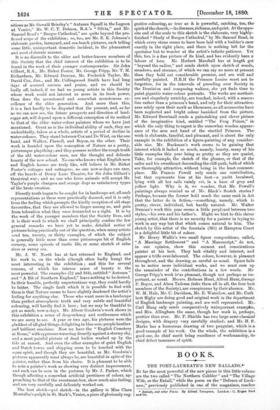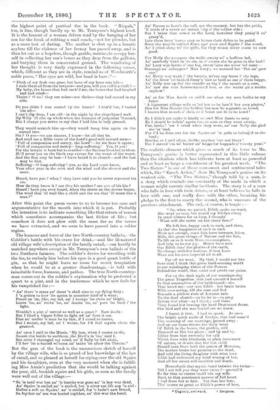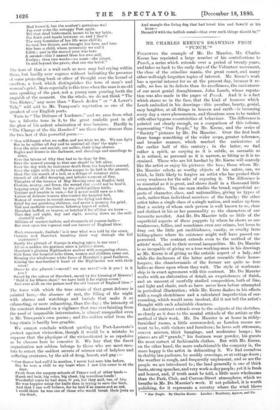BOOKS.
THE POET-LAUREATE'S NEW BALLADS.*`
Br fur the most powerful of the new pieces in this little volume- are the two called "The Northern Cobbler" and "The Village Wife, or the Entail," while the poem on the "Defence of Luck-- now," previously published in one of the magazines, reaches • Ballade, and other Poem,. By Alfred Tennyson. Londob : C.. Keg= Paul and Co. the highest point of poetical fire in the book. " Rizpah," too, is fine, though hardly up to Mr. Tennyson's highest level. It is the lament of a woman driven mad by the hanging of her son for the freak of robbing a mail coach,—not for plunder, but as a mere test of daring. The mother is shut up in a lunatic asylum till the violence of her frenzy has passed away, and is then let out as a hopeless, though gentle, maniac, to occupy her- self in collecting her son's bones as they drop from the gallows, and burying them in consecrated ground. The wandering of her thought is very finely expressed in the following verses, -which, different as they are in style, remind us of Wordworth's noble poem," Her eyes are wild, her head is bare :"— " Flesh of my flesh was gone, but bone of my bone was left—
I stole them all from the lawyers—and you, will you call it a theft ?- My baby, the bones that had suck'd me, the bones that had laughed
and had cried—
Theirs ? 0 no ! they are mine—not theirs—they had moved in my side.
Do you think I was scared by the bones ? I kiss'd 'em, I buried 'em all—
I can't dig deep, I am old—in the night by the churchyard wall. My Willy 'ill rise up whole when the trumpet of judgment '11 sound, But I charge you never to say that I laid him in holy ground.
They would scratch him up—they would hang him again on the cursed tree.
Sin ? 0 yes—we are sinners, I know—let all that be,
And read me a Bible verse of the Lord's good-will toward men-- Full of compassion and mercy, the Lord '—let me hear it again ; `Full of compassion and mercy—long-suffering.' Yes, 0 yes ! For the lawyer is born but to murder—the Saviour lives but to bless. He'll never put on the black cap except for the worst of the worst. And the first may be last—I have heard it in church—and the last may be first.
Suffering-0 long-sufferingyes, as the Lord must know, Year after year in the mist and the wind and the shower and the snow.
Heard, have you ? what ? they have told you he never repented his sin.
How do they know it ? are they his mother ? arc you of his kin ? Heard ! have you ever heard, when the storm on the downs began, The wind that 'ill wail like a child and the sea that 'ill moan like a
man ?"
After this point the poem seems to us to become too sane and argumentative for the mouth into which it is put. Probably the intention is to indicate something like that return of reason which sometimes accompanies the last flicker of life ; but somehow it does not glow with the same fire as the verses we have extracted, and we seem to have passed into a colder region.
The humour and force of the two North-country ballads,—the Cobbler's battle with his crave for drink,—and the ill-natured old village wife's description of the family entail,—can hardly be matched anywhere except in Mr. Tennyson's own ballads of the two Northern farmers. The cobbler's device for wrestling with the foe, to embody him before his eyes in a good quart bottle of gin, so that he might leave no room for secret temptation when he would be at a greater disadvantage,—is told with inimitable force, humour, and pathos. The true North-country- man comes out in the cobbler's explanation why he preferred a quart to a pint, and in the tenderness which he now feels for his vanquished foe :- " An' theer 'e stans an' theer 'e shall stan to my dying daay ; I 'a gotten to looy 'im ageiin in anoother kind of a wally, Proud on 'im, like, my lad, an' I keeiips 'im clean an' bright, Loovs 'im, an' roobs 'im, an' doosts 'im, an' puts 'im back i the
light.
Wouldn't a pint a' served as well as a quart ? Naw doubt : But Hiked a bigger feller to fight wit an' fowt it out.
Fine an' meller 'e mun be by this, if I cared to taaste, But 1 meant, my lad, an' I weiint, fur I'd feel mysen clean die- graiiced.
An' once I said to the Miss* My lass, when I cooms to die, Smash the bottle to smithers, the Divil's in 'im,' said I. But arter I chaanged my mind, an' if Sally be left aloiin, I'll hey 'im a-buried wi'mma an' taiike 'im afoor the Throln."
But the gem of the book is the unconscious sketch of herself by the village wife, who is so proud of her knowledge of the law of entail, and so pleased at herself for crying over the old Squire and his daughters, even at the very moment when she is fulfill- ing Miss Annie's prediction that she would be talking against the poor, old, bookish squire and his girls, so soon as the family were well out of the village:- " Sa 'is taail wur lost an' is boolks wur gone an' is boy war dead, An' Squire 'e smiled an' e smiled, but 'e niver not lift oop 'is ead : Hellas a soft nu Squire! an' e smiled, fur 'e hadn't naw friend, Sa feyther an' son was buried togither, an' this war the "lend.
An' Parson as hasn't the call, nor the mooney, but hes the pride, 'E reads of a sewer an' sartan 'clip o' the tother side; But I begot that sewer as the Lord, howsiver they praiiy'd an' praay'd,
Lets them inter 'eaven easy as leaves their debts to be paiiid. Siver the mou'ds rattled down upo' poor owd Squire i' the wood,
Au' I cried along wi' the gells, fur they weiint Diver coom to naw good.
Far Molly the youngest she walkt nwahy wi' a hofficer lad, An' nawbody 'eiird on 'er sin, an o' coorso she be gone to the bad ! An' Lucy wur Mame o' ono leg, sweet-'arts she niver 'ed none- Straiinge an' uuhoppen* Miss Lucy; we naiimed her ' Dot an' gaw one !'
An' Hetty wur weak i' the hattics, wi'out ony harm i' the legs, An' the fever 'ed beaked Jinny's 'cad as bald as one o' them lieggs, An' Nally war up fro' the craiidle as big i' the nioutli as a cow, Au' saw she nun hammcrgrate,t lass, or she weiint git a innate onyhow !
An' as fur Miss Annie es call'd me afoor my awn fotilks to my fence
A hignorant village wife as 'ad hey to ho larn'd her awn plates,' Hes fur Miss Minnie the heldest has now be a-grawin sa howd, I knaws that mooch o' shell, es it begat not fit to be towd !
Sa I didn't not tuake it kindly ov owd Miss Annie to sally Es I should be talkin' agean em, es soon es they went awaily, Fur, lawks ! 'ow I cried when they went, an' our belly sho gied me 'er 'and, Fur I'd ha done owt fur the Squire an' is galls as belong'd to the land ; Boolks, as I said afoor, Gmbh° nay they 'ere nor timer !
But I served 'em wi' butter au' hegga for huppuds o' twenty year."
The realistic element which gives so much of its force to Mr. Tennyson's genius is better represented in this little volume than the idealism which has hitherto been at least as powerful and at least as large a constituent of his greatest work. " The Two Sisters" is one of those over-sweet and sentimental tales which, like " Enoch Arden," show Mr. Teunyson's genius on its weakest side. " The Two Sisters," though told by a man, is a story which reminds one constantly of the mode in which a woman might narrate similar incidents. The story is of a man who falls in love with twin sisters, or at least believes he falls in love with one, and really does with the other, breaking his pledge to the first to marry the second, who is unaware of the previous attachment. The end, of course, is tragic :- " So, when we parted, Edith spoke no word, She wept no tear, but round my Evelyn clung In utter silence for so long, I thought
What will she never sot her sister free ?'
We left her, happy each in each, and then, As tho' the happiness of each in each Were not enough, must fain have torrents, lakes, Hills, the great things of Nature and the fair, To lift us as it were from commonplace, And help us to or joy. Better have sent Our Edith thro' the glories of the earth, To change with her horizon, if true Love Were not his own imperial all in all.
Far off we went. My God, I would not live Save that I think this gross hard-seeming world Is our misshaping vision of the Powers Behind the world, that make our griefs our gains.
For on the dark night of our marriage-day The great Tragedian. that had quench'd herself In that assumption of the bridesmaid—she That loved me—our true Edith--her brain broke With over-acting, till she rose and fled Beneath a pitiless rush of Autumn rain To the deaf church—to be let in—to pray Before that altar—so 1 think ; and there They found her beating the hard Protestant doors.
She died and she was buried are we know.
I learnt it first. I had to speak. At once The bright quick smile of Evelyn, that had sunn'd The morning of our marriage, passed away : And on our home-return the daily want
Of Edith in the house, the garden, Still Haunted us like her ghost ; and by and by,
Either from that necessity for talk Which lives with blindness, or plain innocence Of nature, or desire that her lost child Should earn from both the praise of Heroism, The mother broke her promise to the dead, And told the living daughter with what love Edith had welcomed my brief wooing of her, And all her sweet self-sacrifice and death.
Henceforth that mystic bond betwixt the twins—
Did I not tell you they were twins ?—prevail'd So far that no caress could win my wife Back to that passionate answer of full heart 1 had from her at first. Not that her love, Tho' scarce as great as Edith's power of love,
• trugately, awkward. t Emigrate.
Had ]essen'd, but the mother's garrulous wail For over woke the unhappy Past again, Till that dead bridesmaid, meant to be my bride, Put forth cold hands between us, and I fear'd The very fountains of her life were chill'd; So took her thence, and brought her here, and here She bore a child, whom reverently we call'd Edith ; and in the second year was born A second—this I named from her own self, Evelyn ; then two weeks—no more—she joined, In and beyond the grave, that one she loved."
'Ile tone of that is a wail such as men may feel crying within them, but hardly ever express without indicating the presence of some protecting husk or other of thought over the kernel of emotion, a husk which distinguishes the tone of man's and woman's grief. More especially is this true when the man is an old man speaking of the past, not a young man pouring forth the anguish of the moment. On the whole, we do not think " The Two Sisters," any more than " Enoch Arden " or " A Lover's 'I'ale," will add to Mr. Tennyson's reputation as one of the greatest of our English poets.
Turn to "The Defence of Lucknow," and we pass from what has a falsetto tone in it, to the great realistic poet in all the glow of his ardent admiration of true heroism. Hardly in " The Charge of the Six Hundred" are there finer stanzas than the two last of this powerful poem :-
" Men will forget what we suffer, and not what we do. We can fight But to be soldier all day and be sentinel all thro' the night— Ever the mine and assault, our sallies, their lying alarms. Bugles and drums in the darkness, and shoutings and soundings to
arms, Ever the labour of fifty that had to be done by five, Ever the marvel among us that one should be left alive, Ever the day with its traitorous death from the loopholes around, Ever the night with its coffinless corpse to be laid in the ground, Heat like the mouth of a hell, or a deluge of cataract skies, Stench of old offal decaying, and infinite torment of flies, Thoughts of the breezes of May blowing over an English field Cholera, scurvy, and fever, the wound that weak/ not be heard, Lopping away of the limb by the pitiful-pitiless knife, Torture and trouble in vain,—for it never could save us a life. Valour of delicate women who tended the hospital bed, Horror of women in travail among the dying and dead, Grief for our perishing children, and never a moment for grief, Toil and ineffable weariness, faltering hopes of relief, Havelock baffled, or beaten, or butcher'd for all that we knew— Then day and night, day and night, coming down on the still- shatter'd walls
Millions of musket-bullets, and thousands of cannon-balls- But ever upon the topmost roof our banner of England blew.
Hark cannonade, fusilade ! is it true what was told by the scout, Outram and Havelock breaking their way through the fell mutineers ?
Surely the pibroch of Europe is ringing again in our ears ! All on a sudden the garrison utter a jubilant shout, Havelock's glorious Highlanders answer with conquering cheers, Sick from the hospital echo them, women and children come out, Blessing the wholesome white faces of Havelock's good fusileers, Kissing the war-harden'd hand of the Highlander wet with their tears!
Dance to the pibroch !—saved ! we are saved !—is it you ? is it you ? Saved by the valour of Havelock, saved by the blessing of Heaven! ' Hold it for fifteen days !' we have held it for eighty-seven !
And ever aloft on the palace roof the old banner of England blew."
The force with which the true strain of that great defence is painted here,—the absence of rest, the filling of the night with alarms and watchings and burials that make it as exhausting, or more exhausting, than the day ; the intensity of the constant demand on a vigilance that was ever fainting from the need of impossible intermission, is almost unequalled even in Mr. Tennyson's own poems ; and the sudden relief from the long strain is hardly less graphic.
We cannot conclude without quoting the Poet-Laureate's protest against vivisection, though it would be a mistake to suppose that the physique of the vivisectionist is so repulsive as he chooses here to conceive it. We fear that the finest organisation not seldom belongs to those who are most reso- lute to extort the saddest secrets of science out of helpless and suffering creatures, by the aid of drug, lancet, and gag :-
" Our doctor had call'd in another, I never had seen him before,
But he sent a chill to my heart when I saw him come in at the door, Fresh from the surgery-schools of France and of other lands— Harsh red hair, big voice, big chest, big merciless hands ! Wonderful cures he had done, 0 yes, but they said, too, of him He was happier using the knife than in trying to save the limb, And that I can well believe, for he look'd so coarse and so red, I could think he was one of those who would break their jests on the dead,
And mangle the living dog that had loved him and fawn'd at his knee-
Drench'd with the hellish oorali—that ever such things should be!"








































 Previous page
Previous page